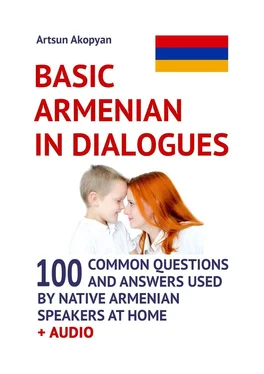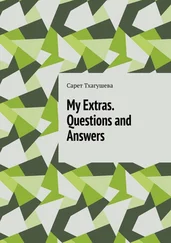Basic Armenian in Dialogues
100 Common Questions and Answers Used by Native Armenian Speakers at Home + Audio
Artsun Akopyan
Translator Veronika Sargisyan
© Artsun Akopyan, 2020
© Veronika Sargisyan, translation, 2020
ISBN 978-5-4498-3199-6
Created with Ridero smart publishing system
The teach-yourself book “ Basic Armenian in Dialogues: 100 Common Questions and Answers Used by Native Armenian Speakers at Home” contains 100 mini-dialogues based on everyday topics: “Morning”, “Using the Bathroom”, “Morning Exercises”, “Clothes”, “Breakfast”, “Cooking Dinner”, “Setting the Table”, “Plans for the Afternoon”, and “Evening”. The book consists of the dialogues in English and Armenian, word-for-word transliteration and translationas well as some explanatory notes. Each topic is followed by exercises in the Revisionsection. The Armenian alphabet is in the last chapter. All the dialogues are available online as free audio recordings.
Artsun Akopyan worked as a university teacher and freelance translator. He writes fiction including novels and short stories, and nonfiction such as foreign language textbooks and applied psychology books.
How to Use the Book and Audios
In the Armenian language, the stressis most often placed on the last syllable in a word.
In this tutorial, only newArmenian words are translatedone by one after each mini-dialogue.
Transliteration of Armenian words into English does not convey sounds accurately, therefore it is recommended to learn the Armenian alphabet(39 letters) before studying this course (see the last chapter).
Read a mini-dialogue in English and Armenian while playing a corresponding audio. Repeat the translation during pauses. The pauses are long enough for you to be able to reproduce the translation. Learn the translation of new words given below the dialogue. In the “ Revision” section, translate the dialogues from Armenian into English and from English into Armenian.
Study the dialogues using the audio recordings. Every day, practice the dialogues without looking at the text. Try to say the translation out loud during pauses without any errors. Play the audio as many times as necessary to ensure that you know the material perfectly well.
Ask your family members to learn the dialogues together. Use the learned phrases and sentences to speak Armenian at home to improve your speaking skills.
The audio recordingsare available at:
https://artsunakopyan.wixsite.com/en-arm

առավոտ(arravot) – morning
1
“Good morning. Wake up!”
“I am not sleeping.”
– Բարի լույս: Արթնացի՛ր:
Bari luys. Artnatsir.
– Ես քնած չեմ:
Yes knats chem.
բարի(bari) – good, kind
լույս(luys) – light
արթնացնել(art’nats’nel) – to wake up
արթնացիր(art’nats’ir) – wake up!
ես(yes) – I
քնել(k’nel) – sleep
քնած(k’nats) – sleeping
եմ(yem) – (I) am
չեմ(ch’em) – (I) am not
NOTES.
In the Armenian language, the stressis most often placed on the last syllable in a word.
In this text, only newArmenian words are translated one by one after each mini-dialogue.
Transliteration of Armenian words into English does not convey sounds accurately, therefore it is recommended to learn the Armenian alphabet(39 letters) before studying this course (see the last chapter).
2
“It’s time to get up!”
“I am getting up already.”
– Վեր կենալու ժամանակն է:
Ver kenalu zhamanakn e.
– Արդեն վեր եմ կենում:
Arden ver em kenum.
վեր(ver) – up
կենալ(kenal) – to stay (this verb is not used independently)
վեր կենալ(ver kenal) – get up
ժամ(zham) – hour
ժամանակ(zhamanak) – time
ժամանակն(zhamanakn) – the time
է(e) – is
արդեն(arden) – already
վեր եմ կենում(ver em kenum) – I am getting up
3
“Did you have a good sleep?”
“Yes, I did.”
– Լավ քնեցի՞ր:
Lav k’nets’ir?
– Այո:
Ayo.
լավ(lav) – good
քնել(k’nel) – to sleep
քնեցիր(k’nets’ir) – you were asleep
լավ քնեցիր(lav k’nets’ir) – you slept well
4
“What dreams did you have?”
“I don’t remember.”
– Ի՞նչ երազ տեսար:
Inch’ yeraz tesar?
– Չեմ հիշում:
Ch’em hishum.
ինչ(inch’) – what?
երազ(yeraz) – dream
տեսնել(tesnel) – see
տեսար(tesar) – you saw
հիշել(hishel) – to remember
հիշում(hishum) – (I, you, he, she, etc.) remember
չեմ հիշում(ch’em hishum) – I do not remember
5
“Where are you going?”
“I am going to the bathroom.”
– Ու՞ր ես գնում:
Ur es gnum?
– Գնում եմ լոգարան:
Gnum em logaran.
ուր(ur) – where
ես(es) – (you) are (singular)
գնալ(gnal) – to go
գնում(gnum) – going
լոգարան(logaran) – bathroom
6
“Put on your slippers!”
“No, I want to go barefoot.”
– Հագիր հողաթափերը:
Hagir hoghat’ap’ery.
– Ոչ, ուզում եմ ոտաբոբիկ գնալ:
Voch’, uzum em votabobik gnal.
հագնել(hagnel) – to wear
հողաթափ(hoghat’ap’) – slipper
հողաթափեր(hoghat’ap’er) – slippers
ոչ(voch’) – no
ուզել(uzel) – to want
ուզում(uzum) – (I, you, he, she, etc.) want
Читать дальше













